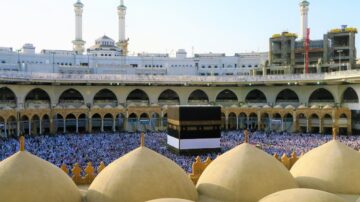All praise is due to Allah Who has created time and has made some periods of time superior to others. He has made some days, nights, and months to be of greater value than others, when rewards are multiplied many times as a mercy towards His slaves. This encourages them to do more righteous deeds and makes them more eager to worship Him, so that the Muslim renews his efforts to gain a greater share of reward and so that he can prepare himself for death and the Day of Judgment.
These seasons of worship bring many benefits, such as the opportunity to correct one’s faults and make up for any shortcomings. Each of these special occasions involves some kind of worship through which the slaves can draw closer to Allah and get some kind of unique blessings. The successful and exultant person is the one who makes the most of these special hours, days, and months and draws nearer to his Lord during these times through acts of worship.
Among these special seasons of worship are the first 10 days of Dhul-Hijjah, which Allah has preferred over all other days of the year. Ibn `Abbas (may Allah be pleased with him) reported that the Prophet (peace and blessings be upon him) said, “There are no days in which righteous deeds are more beloved to Allah than these ten days.” The people asked, “Not even jihad for the sake of Allah?” He replied, “Not even jihad for the sake of Allah, except for the case of a man who went out to fight giving himself and his wealth up for the cause and returned with nothing” (Al-Bukhari).
The text mentioned above indicates that these 10 days are better than all the other days of the year, without exception, not even the last 10 days of Ramadan. But the last 10 nights of Ramadan are better than the first 10 nights of Dhul-Hijjah, because they include Laylat Al-Qadr (the Night of Decree), which is better than a thousand months. Thus the various reports may be reconciled.
The virtue of these 10 days is confirmed by many proofs:
Allah swears an oath by them, and swearing an oath by something is indicative of its importance and great benefit. Allah says: [By the dawn; and by the ten nights] (Al-Fajr 89:1-2). Ibn `Abbas, Ibn Az-Zubayr, Mujahid, and others of the earlier and later generations of exegetes said that this refers to the first 10 days of Dhul-Hijjah.
The Prophet (peace and blessings be upon him) commanded us to abundantly remember Allah and make dhikr. `Abdullah ibn `Umar (may Allah be pleased with him) reported that the Prophet (peace and blessings be upon him) said, “There are no days greater in the sight of Allah and in which righteous deeds are more beloved to Him than these ten days, so during them say a great deal of La ilaha illa Allah, Allahu Akbar, and Al-hamdu lillah” (Ahmad).
Satan, te enemy of Allah, was never seen more humiliated and enraged than on the day of the Battle of Badr—except on the Day of `Arafah. On that day he sees the mercy that Allah sends down and His forgiveness of sins.
There is no other day on which the extent of forgiveness and mercy reaches such a level like the Day of `Arafah. On `Arafah Allah frees people from the Hellfire. `A’ishah (may Allah be pleased with her) narrated that the Prophet (peace and blessings be upon him) said
There is no day in which Allah frees greater number of His slaves from the Hellfire than the Day of `Arafah. Allah comes close to His slaves and boasts about them to the angels, then asks (a rhetorical question): “What do these slaves seek?” (Muslim)
In another narration the Prophet (peace and blessings be upon him) reports that Allah says to His angels, “I make you witnesses that I forgave them.” The angels would then say, “O Allah! So-and-so is overburdened with sins.” Allah replies, “I forgave them all” (Ibn Khuzaymah).
Al-Manawi said, “The fact that Allah boasted about His slaves to the angels denotes His forgiveness because Allah would not have boasted in front of the pure and sin-free angels unless the pilgrims had become clear of all sins.”
Bilal (may Allah be pleased with him) narrated that the Prophet (peace and blessings be upon him) said to him in the morning when people gathered (in Muzdalifah), “O Bilal! Tell the people to be silent!” Then he said to them, “Allah blessed you in this gathering and forgave the sinful among you due to the fact that you were amid the pious—and He granted the pious what they asked for” (Ibn Majah).
Hakim Ibn Hizam (may Allah be pleased with) used to stand in `Arafah bringing one hundred camels and one hundred slaves (he was only obliged to sacrifice one seventh of a camel). He would then start freeing the slaves for the sake of Allah. The people would then start crying loudly with du`aa’ saying, “O Allah! Your slave freed his slaves, and we are Your slaves, so free us (from the Hellfire).”
Al-Fudhail saw the supplications of people and their weeping on the night of `Arafah and asked the crowds, “If these people went to a man and asked him for a daniq (a very small amount of money), would he refuse?” The people said, “No.” He said, “Allah’s forgiveness is even easier to obtain than that.”
Ibn Al-Mubarak said, “I went to Sufyan Ath-Thawri on the night of `Arafah and he was kneeling down and crying. I asked him, ‘Who is the worst person in this gathering?’ He said, ‘He who thinks Allah will not forgive him.’”
The foregoing are just a few of the many wonderful stories that you hear from this blessed and pure land. Here you will see people supplicate with humbleness, repentance, and regret; they will cry over their sins and shortcomings. Many are those who asked forgiveness and were forgiven; who cried and pledged to refrain from sinning and had their sins wiped out. Many come out of `Arafah sinless with joyful hearts and happy faces.
Moreover, the Day of `Arafah is so blessed that fasting on it will expiate for the sins of two years as reported in the Sahih of Muslim. So, non-pilgrims should not let this golden opportunity slip through their fingers.
As for those who were unable to perform Hajj and missed standing in `Arafah, let them fulfil all the other rights of Allah. He who could not spend the night in Muzdalifah, let him pledge to obey Allah in all other matters; he who could not slaughter his sacrifice, let him give up his whims and desires; and he who could not reach the house of Allah (the Ka`bah), let him supplicate to Allah, the One Who is nearer than one’s jugular vein. For those who could not make it to `Arafah, follow the advice of your Prophet (peace and blessings be upon him) and fast that day.
May Allah forgive our sins, increase our faith, and accept us in these blessed days.
By Ashraf Salah**

















